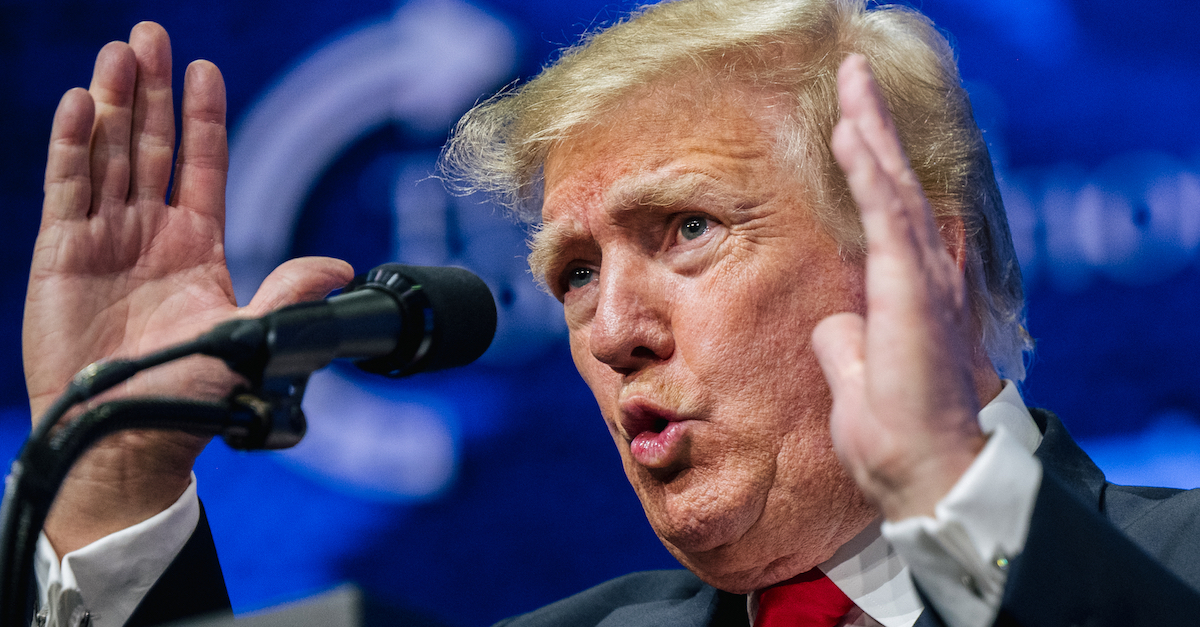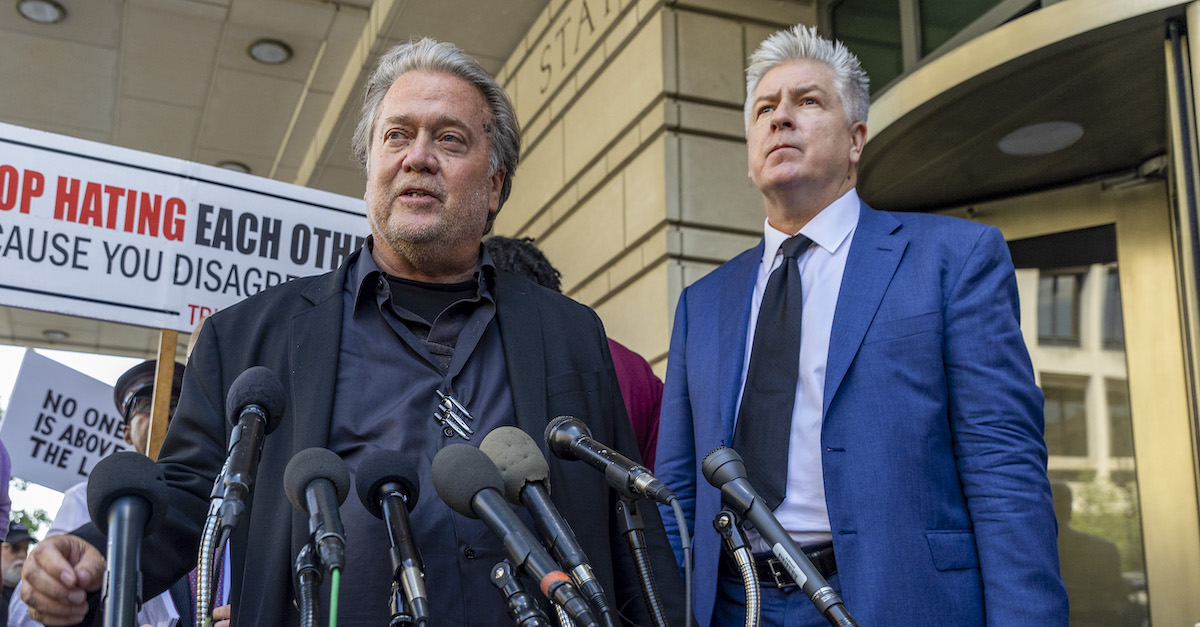
Former U.S. President Donald Trump spoke at a rally in Phoenix on July 24, 2021. (Photo by Brandon Bell/Getty Images.)
A letter revealed late Monday on the website of a conservative writer says that the National Archives and Records Administration (NARA) was concerned about former president Donald Trump’s retention of documents at the “highest levels of classification, including Special Access Program (SAP) materials,” at his Mar-a-Lago estate in Florida.
Those concerns triggered the signing of an Aug. 5 search warrant and a subsequent Aug. 8 FBI search of the palatial Palm Beach premises.
The letter, dated May 10, was posted to the website of John Solomon in its purported entirety on Mon., Aug. 22. The document quotes another letter from the Department of Justice’s National Security Division dated April 29, 2022, to describe the materials in question:
There are important national security interests in the FBI and others in the Intelligence Community getting access to these materials. According to NARA, among the materials in the boxes are over 100 documents with classification markings, comprising more than 700 pages. Some include the highest levels of classification, including Special Access Program (SAP) materials. Access to the materials is not only necessary for purposes of our ongoing criminal investigation, but the Executive Branch must also conduct an assessment of the potential damage resulting from the apparent manner in which these materials were stored and transported and take any necessary remedial steps. Accordingly, we are seeking immediate access to these materials so as to facilitate the necessary assessments that need to be conducted within the Executive Branch.
The May 10 letter that contained the quoted passage was sent to Trump attorney M. Evan Corcoran, who on Monday filed court papers seeking to attack — but not to fully quash — the search warrant aimed at Mar-a-Lago. (Corcoran also recently represented Steve Bannon.)

Former White House senior strategist Stephen Bannon and his lawyer Matthew Evan Corcoran talk to media outside the Federal District Court House after Bannon was found guilty of contempt of Congress on July 22, 2022 in Washington, D.C. Bannon’s legal team did not call witnesses, and Bannon did not testify in his own defense during the trial. (Photo by Tasos Katopodis/Getty Images.)
The letter from acting U.S. Archivist Debra Steidel Wall indicates that Corcoran, on Trump’s behalf, requested at least twice — once on April 29 and again on May 1 — for the National Archives and Records Administration to “delay the disclosure” of the records to the FBI.
“In accord with that agreement,” Wall wrote, “we had not yet provided the FBI with access to the records when we received your letter on April 29, and we have continued to refrain from providing such access to date.”
“As you are no doubt aware,” Wall continued to Corcoran, “NARA had ongoing communications with the former President’s representatives throughout 2021 about what appeared to be missing Presidential records, which resulted in the transfer of 15 boxes of records to NARA in January 2022.”
A review of those materials revealed “items marked as classified national security information, up to the level of Top Secret and including Sensitive Compartmented Information and Special Access Program materials,” Wall continued. “NARA informed the Department of Justice about that discovery, which prompted the Department to ask the President to request that NARA provide the FBI with access to the boxes at issue so that the FBI and others in the Intelligence Community could examine them.”
That process, according to the letter, led to the involvement of the White House Counsel’s Office.
The letter explains:
On April 11, 2022, the White House Counsel’s Office — affirming a request from the Department of Justice supported by an FBI letterhead memorandum — formally transmitted a request that NARA provide the FBI access to the 15 boxes for its review within seven days, with the possibility that the FBI might request copies of specific documents following its review of the boxes.
The document asserts that NARA then wrote to Corcoran on April 12 that the “urgency” of the matter required the FBI’s involvement; however, another grace period was extended by the White House Counsel’s Office until April 29, the letter indicates.
Weeks went by. Corcoran replied on April 29 that Trump needed additional time to review the materials to determine whether to assert “executive privilege” over at least some of the documents.

Debra Steidel Wall appears in an official NARA photo.
Despite the involvement of the current White House Counsel under President Joe Biden, the letter indicates the Biden White House was patient in the aforementioned manner and by deferring significantly to the machinations and mental impressions of federal agencies with oversight duties over the disputed documents:
The Counsel to the President has informed me that, in light of the particular circumstances presented here, President Biden defers to my determination, in consultation with the Assistant Attorney General for the Office of Legal Counsel, regarding whether or not I should uphold the former President’s purported “protective assertion of executive privilege.” See 36 C.F.R. § 1270.44(f)(3). Accordingly, I have consulted with the Assistant Attorney General for the Office of Legal Counsel to inform my “determination as to whether to honor the former President’s claim of privilege or instead to disclose the Presidential records notwithstanding the claim of privilege.” Exec. Order No. 13,489, § 4(a).
The letter then cut closer to the merits of the apparent dispute over whether Trump could maintain custody over the materials in the face of an attempt by the government to take them back — or, as Trump’s supporters might argue, whether Trump can withhold the material from the Biden Administration.
“The Assistant Attorney General has advised me that there is no precedent for an assertion of executive privilege by a former President against an incumbent President to prevent the latter from obtaining from NARA Presidential records belonging to the Federal Government where ‘such records contain information that is needed for the conduct of current business of the incumbent President’s office and that is not otherwise available,'” Wall continued, citing 44 U.S.C. § 2205(2)(B).
The letter then launched a paragraph-long legal analysis of several cases to support that premise, including Nixon v. Administrator of General Services, 433 U.S. 425 (1977), which Wall said “strongly suggests that a former President may not successfully assert executive privilege ‘against the very Executive Branch in whose name the privilege is invoked.'”
Indeed, she said, “[t]he Executive Branch remains in full control of the Presidential materials,” again quoting case law.
Wall then suggested that the immediate issue was more simple:
It is not necessary that I decide whether there might be any circumstances in which a former President could successfully assert a claim of executive privilege to prevent an Executive Branch agency from having access to Presidential records for the performance of valid executive functions. The question in this case is not a close one. The Executive Branch here is seeking access to records belonging to, and in the custody of, the Federal Government itself, not only in order to investigate whether those records were handled in an unlawful manner but also, as the National Security Division explained, to “conduct an assessment of the potential damage resulting from the apparent manner in which these materials were stored and transported and take any necessary remedial steps.” These reviews will be conducted by current government personnel who, like the archival officials in Nixon v. GSA, are “sensitive to executive concerns.” Id. at 451. And on the other side of the balance, there is no reason to believe such reviews could “adversely affect the ability of future Presidents to obtain the candid advice necessary for effective decisionmaking.” Id. at 450. To the contrary: Ensuring that classified information is appropriately protected, and taking any necessary remedial action if it was not, are steps essential to preserving the ability of future Presidents to “receive the full and frank submissions of facts and opinions upon which effective discharge of [their] duties depends.” Id. at 449.
Wall then asserted “an assertion of executive privilege against the incumbent President under these circumstances would not be viable.” Such claims, Wall said, are generally made between the president and Congress, not between one president and another president.
Wall also said that the roadblocks sought and suggested by Trump would only “delay those very important reviews” as to whether or not privilege could be asserted by a former president over the release of the material.
In the end, Wall indicated that she “decided not to honor” Trump’s claim of “protective” privilege.
“[U]nless the incumbent President ‘uphold[s]’ the claim asserted by the former President, ‘the Archivist discloses the Presidential record,'” Wall said while citing an executive order and a federal regulation.
“For the same reasons,” Wall continued, “I have concluded that there is no reason to grant your request for a further delay before the FBI and others in the Intelligence Community begin their reviews. Accordingly, NARA will provide the FBI access to the records in question , as requested by the incumbent President, beginning as early as Thursday, May 12, 2022.”